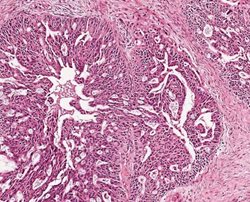February 15, 2018 Print
New research has shown that the genes we inherit can have a significant impact on how the body processes chemotherapy drugs, which may lead to different clinical outcomes for ovarian cancer patients.
Research has identified gene variants that play a significant role in how women with ovarian cancer process chemotherapy.
The research showed that the genes we inherit can have a significant impact on how the body processes chemotherapy drugs, which may lead to different clinical outcomes for ovarian cancer patients.
Lead researcher, Professor Anna deFazio from the Westmead Institute for Medical Research and Westmead Hospital, said this discovery may help doctors predict which patients will respond positively to chemotherapy.
 Professor Anna deFazio
Professor Anna deFazio
“Chemotherapy and surgery are the standard treatment for women with ovarian cancer, but each patient responds differently.
“We wanted to know why some women respond very positively to treatment, while others suffer serious side effects, and some have a poor response,” Professor deFazio said.
“We set out to understand which genetic factors influence how a patient processes chemotherapy.
“Our research showed that a gene called ABCC2 plays a critical role in eliminating chemotherapy from the body,” she explained.
ABCC2 is a drug transporter, which means it pumps a variety of different substances out of cells.
“We found that variants of this gene are associated with high rates of drug elimination, which means they pump chemotherapy drugs out of the body quickly and may cause the treatment to be less effective.
“This may explain why chemotherapy is an effective treatment for some women, but not for others,” she said.
Professor deFazio said these latest research findings are an important step towards delivering better outcomes for patients.
“Now that we are beginning to understand the role of the ABCC2 gene, and other novel gene variants that were identified in this research, we can work towards developing personalised cancer treatment for patients,” Professor deFazio concluded.
 Ovarian cancer cells
Ovarian cancer cells
Ovarian cancer is the most lethal gynaecological cancer and ranks as the sixth most common cause of cancer-related death in women in the Western world.
Professor Anna deFazio, and Associate Professor Stuart Macgregor and Professor Georgia Chenevix-Trench at the QIMR Berghofer Medical Research Institute led this research and it was part of a PhD project undertaken by Dr Bo Gao, now a Medical Oncologist at Westmead and Blacktown Hospitals.
The full paper is available online at Nature Scientific Reports: https://www.nature.com/articles/s41598-018-19590-w